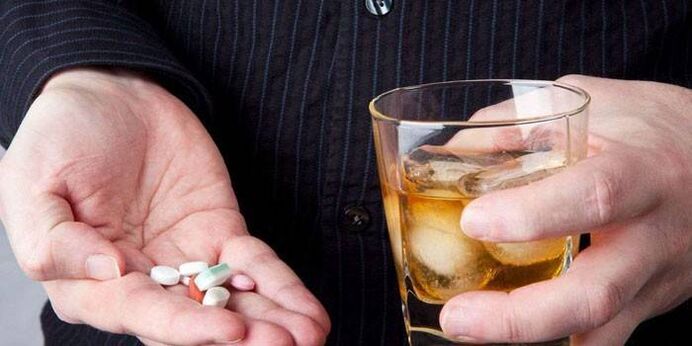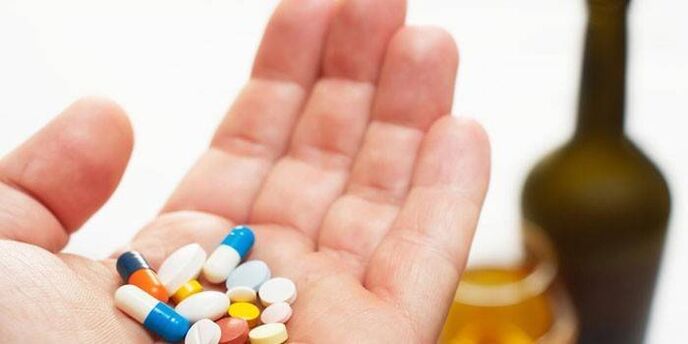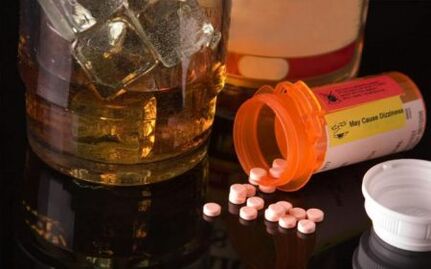Alcohol and antibiotics are mutually exclusive concepts and their simultaneous use will cause irreparable harm to health.Antibiotics were treated by many serious illnesses even though those who were considered incurable 100 years ago.They succeeded in destroying, killing various viruses, bacteria, and today remain the most effective medicine.Their use with alcohol can lead to resuscitation.Therefore, when the drug cycle ends, your doctor should explain when you can drink alcohol after taking antibiotics.

Antibiotics of our day
The effectiveness of antibacterial medicine is difficult to be too high as it is not possible to calculate the number of life saved, thanks to these bitter medicines.Modern pharmacological power produces a large number of these important drugs.
Medicine has reached such a height that their intake has become safe for young children, and some types of antibiotics are prescribed even for infants.The course of taking antibiotics ranges from several days to 1-2 months.Doctors strongly recommend not disturbing and treating it from the first day to the last day, observing the precautions, and more to apply taboo on all types of alcohol.
The specialty of antibiotic treatment is that they should be taken for a few days.Some medicines should not be mixed, drink tightly in the morning, day or evening - before eating or after meals - in general, note the dose and frequency.If these issues cause difficulties, it is best to consult a therapist and not be treated with non -systematic people.
This topic is also closed about the validity of antibiotics.The non -systematic use of antibacterial drugs, antiviral that implies antibiotics is at high risk.And don't forget that the medicine itself has a side effect.They are true -are actually incompatible with alcohol.Therefore, during the duration of the therapeutic course prescribed by the doctor, it is not acceptable to combine the use of medicines and at the same time pass one or two glass.
Pleasure can end with sadness
If someone still thinks that you can take antibiotics and at the same time drink alcohol-to convince people like the reverse opinion is easy.It is necessary to advise him, to read the annotations for any antibiotics, where it is written in black and white on the high risk of combining alcohol and drugs.And this is not a empty word.The most harmless will be a useless treatment factor, taking drugs.And well, if it turns out, and not vice versa.
There are enough examples when, after "snacks" with alcohol antibiotics, the continuation of the banquet is sad.In many cases, only resuscitators can lower the "level of fun" and save the lives of careless patients.The dangers of combining these two exclusive materials.
Antibiotics, in its structure, are natural or chemical (synthetic and synthetic) chemicals.If their intake is prescribed by a therapist, then some complex infections are rampant in the body, and alcohol, its use, can damage the clinical picture.
Distribution, based on antibiotics and alcohol, will cause additional harm to health:
- During this disease, the body is weak, immunity is suppressed, and drinking alcohol will not work in any way.
- Antibiotics, by themselves, are not in the best way affect the kidneys and heart, interfere with the balance of the intestinal microflora.
- The use of mutual alcohol -Medicine -Medicines will cause irreparable harm to health.Kidney and liver may not be able to overcome increased load, which threatens liver or kidney failure.
- If antibiotic intake is stated, alcohol should be excluded for a few days.Otherwise, all treatments will go on the drain.The virus, thanks to the combination of medicines and alcohol, will not be destroyed, but strengthens, gets resistant.
- We need to convert antibiotics to new generation drugs, which poses additional risks.
- If you take alcohol during treatment, bacteria can be immune to therapy and then in the sky it will loosen a very sad end - clinical death from sepsis.
So, before drinking antibiotics with a glass of wine, it is best to think a thousand times.
A direct threat to health

In addition to the above dangers, take such medicines along with alcoholic beverages (though high) threatening:
- dizzy;
- cloud cause;
- nausea and vomiting;
- allergic reactions;
- Long migraines.
Taking alcohol, together with drugs, leads to functional violations of almost all body systems.The immune system under the influence of alcohol will also be suppressed.Another unpleasant moment lies in a significant increase in alcohol.Someone hangs faster, and the intoxication will last longer than usual, with unpleasant consequences.However.Antibiotics are included in the category of drug groups, so lovers combine alcohol and drugs will have continuous addiction to antibacterial agents.That is, in the future, treatment may not work.
Also, when alcohol and antibiotics enter the body, they break into simple compounds.Some drug molecules are in line with alcohol molecules, and this fact pose a unusual threat to health.The body system sees alcohol as a drug and begins to respond.
The doctor knows everything
Of course, after treatment, one way or another, you need to enter the rhythm of normal life, however, it is highly recommended to influence careful questions with the attending physician.That is, is it possible to drink alcohol after antibiotics and when?How many days do you have to pass after using the last tablet or capsule?Through what time hours it is allowed to drink some wine or beer?When and how much can you use a large dose of alcohol?All of these issues should be heard from the patient at the receipt of the therapist after the final healing.
Taking his own prohibition, a person is at risk for his or her health (instead of a pain, you can make some), and in some cases - life.
Doctors, answering questions when you can drink alcohol after antibiotics, that is, after how long, they focus on the medication, the terms for the excretion of the body, the dose and time of treatment.Well, of course, in the danger of carrying alcohol if you drink it with a horse dosage.The doctor determines the individual period for each patient.Any doctors understand perfectly that everyone cannot be carried under one brush.
Each individual has his or her own body and prescribed treatment methods.The power produces a large list of these drugs, and each has its own pharmacological properties.Some are quickly removed from the body, others long in the liver, tissues, blood, and others.Therefore, an experienced doctor will not immediately say how long and when to drink.He will analyze all the risks and only after a comprehensive analysis will produce his decision.
Better to wait
Some experts in medicine argue that minimal abstinence from alcohol after completing antibiotics will be 10 days.The number of days is better to wait.It is not possible, before the above period, seduce yourself with a glass of alcohol.Although 7 days are shown in annotations, it is not the fact that antibiotics completely leave the body.We remind you - everyone and their health - individually.Therefore, the abstinence time is required to determine the doctor.Failure to comply with the proposal to threaten serious consequences, written above.

Ignore the doctor's instructions, that is, freely cover the question of how much alcohol time will be allowed and begin to take alcohol immediately after treatment - to make the following problems:
- manifestations of allergic reactions, sometimes in severe form;
- There will be strong poisoning;
- The previous course of treatment will be ineffective (the appointment of other antibiotics will give hybrants to microbes to reproduce again, and how many courses are repeatedly known);
- The percentage of antibiotics in the body, together with alcohol, will be highly affected by essential organs and then additional treatment, in the past, will require healthy organs.
It is quite easy to avoid these and other effects.You just have to wait 10 days, and better, take a detailed consultation from the attending physician.























